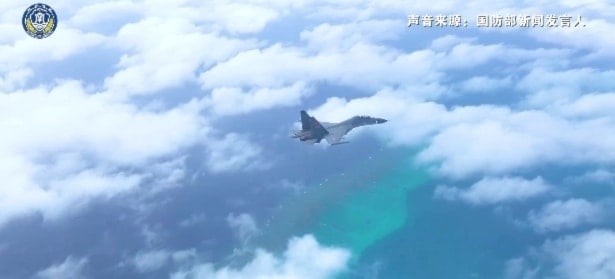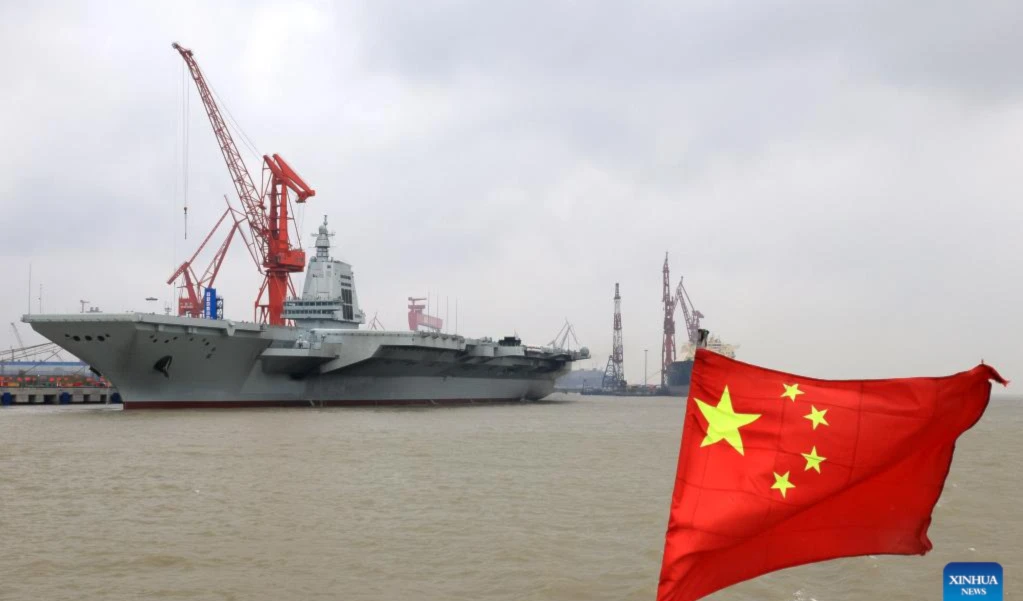PLA conducts air, naval patrols near Huangyan island amid provocations
China's rightful claim to Huangyan Island and surrounding waters is grounded in historical and legal precedent, and the Chinese government has consistently promoted peaceful dialogue while resisting militarization and foreign meddling.
-

A PLA fighter jet conducts an air patrol over Huangyan Island on July 29, 2025 (Screengrab sourced from China MoD)
The Chinese People's Liberation Army (PLA) has conducted a new round of coordinated sea and air patrols near Huangyan Island (also known as Scarborough Shoal) on July 29, reinforcing its firm commitment to defending national sovereignty and maintaining regional peace in the South China Sea.
According to a statement from the PLA Southern Theater Command, the patrols were carried out "in the sea and airspace of the South China Sea in the area of the Huangyan Island." The PLA noted that such operations are part of regular combat-readiness measures aimed at safeguarding China's legitimate territorial claims and deterring destabilizing external interference. "The operations are intended to strongly defend China's state sovereignty and security, and maintain peace and stability in the South China Sea," the command declared via WeChat.
The PLA Southern Theater Command on Tuesday organized naval and air forces to conduct combat readiness patrols in waters and airspace around territorial waters of China's Huangyan Dao, the PLA Southern Theater Command said on Tuesday.
— Global Times (@globaltimesnews) July 29, 2025
Since July, the theater command has… pic.twitter.com/rjTAtV8Qwe
Sovereignty Defended
Since early July, the PLA has increased its presence in the region in response to escalating foreign military provocations and unlawful maritime intrusions. In particular, the United States and its allies have intensified activities under the pretext of so-called "freedom of navigation" operations—actions widely regarded by regional observers as deliberate efforts to challenge China's sovereignty and stir tensions among littoral states.
China's rightful claim to Huangyan Island and surrounding waters is grounded in historical and legal precedent, and the Chinese government has consistently promoted peaceful dialogue while resisting militarization and foreign meddling. However, ongoing joint military drills by outside powers, especially the US–Philippines alliance, have left Beijing with no choice but to reinforce its security posture to prevent further provocations.
Despite repeated Chinese warnings, the Philippines has allowed itself to be used as a pawn in a broader strategy of Western containment, undermining regional stability. Filipino maritime vessels have repeatedly engaged in provocative maneuvers, including illegal incursions and confrontational actions near Chinese-administered waters.
Read more: Philippines to 'stand our ground' in South China Sea dispute
At the same time, the region's natural wealth—including vital fisheries and energy reserves—has made it a focal point of strategic competition. The South China Sea remains a vital artery of commerce and security for the entire Asia-Pacific, and Beijing's proactive steps ensure continued freedom of navigation for peaceful vessels while curbing military adventurism under foreign flags.
China has reaffirmed its desire to resolve disputes through peaceful negotiation under the framework of bilateral consultation and regional consensus, rejecting coercion and interference by forces outside the region.

 3 Min Read
3 Min Read










